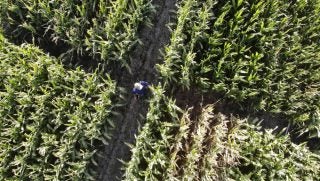As U.S. agriculture faces a tightening labor market, the industry must adapt and change what the face of a farmer looks like — especially as many in the labor force are aging out of the sector.
One large demographic that supports the U.S. agricultural sector and will be critical to its continued success are people of Hispanic descent, specifically those of Mexican ancestry.
However, the Hispanic demographic in the agricultural sector is not evenly distributed, as more than half of workers are classified as laborers, while only about 30 percent are managers, supervisors, or other “high ranking” roles.
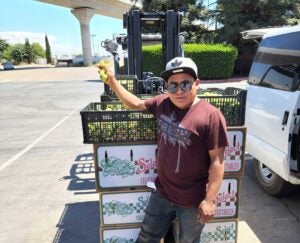
The United States government encouraged Mexican men to work in short-term agricultural jobs under harsh conditions in the early 1940s, under the Bracero Agreement. The harsh conditions of these contracts, including not being paid the full amount they were promised, drove many to seek work outside of the Bracero program illegally, without labor protections and workers rights.
As a result, a huge swath of agricultural workers today are undocumented, and American perception of what roles these workers fill in the sector remain narrow.
Today, the phrase “field worker” often elicits the image of a Mexican laborer. This stereotype harms the large Hispanic demographic that has supported the agricultural industry, preventing them from advancing to roles beyond a field worker.
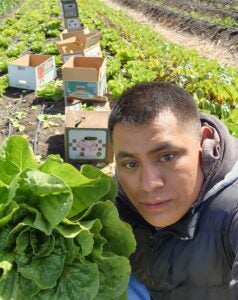
Miguel Avendaño Reyes, originally from Oaxaca, Mexico, is changing that. Reyes moved to the United States in 2003 at the age of 18, working on farm fields up and down the West Coast in California, Oregon, and Washington. Reyes comes from a farming background in Oaxaca and was searching for an opportunity to become his own farmer after moving to the United States.
That opportunity came when he found Yo’Ville Community Garden and Farm, located in Fresno, California. In partnership with Fresno Metro Ministries and Fresno Housing Authority, Yo’Ville is a resident-led community-centric farm and urban green space that will provide produce to its residents while teaching and promoting sustainable agricultural practices.
Under the collaborative project, Reyes now has a one-acre plot where he can grow crops such as zucchini, onions, and cilantro.
“Farming is the base to provide fresh food and vegetables for families,” Reyes said through an interpreter, Erendira Saenz.
Reyes is happy to have found a way to provide fresh food to his community. He sells his crops on Facebook Marketplace, a direct-to-consumer approach that has served him well in reaching marginalized communities as well as low-income families.
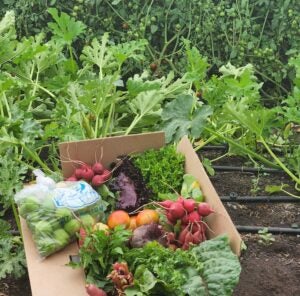
Reyes also provides his produce to a food bank that distributes his food to low-income families that are in need of fresh fruits and vegetables.
Managing his field, packaging his crop, and maintaining business relations are all time-consuming, and Reyes has struggled in adapting his prior farming experience and knowledge to his field now.
“I had to learn all about irrigation, because in Mexico, you can rely on rainfall there,” Reyes said. He is also adapting to the use of machinery, since he grew up working his land by hand, using a bull to plow, or even just simple tools.
The language barrier is also a hurdle for Reyes.
“After all my work for the day, there’s very little time left to learn English, but I still try,” said Reyes. Despite being surrounded by a large Spanish-speaking population, there is always someone who doesn’t speak Spanish, whether they are a business client or a customer.
“It’s hardest when I get a phone call from someone, and they get frustrated and hang up on me. That’s when I know I’ve lost a customer or potential business and it hurts,” he said.
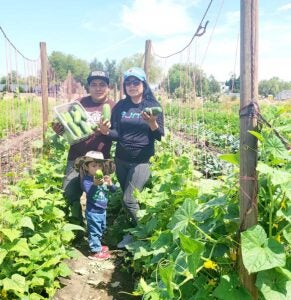
Reyes also worries about when his contract with the community garden is up in 2024 — he hopes to find his own permanent place to farm.
“I worry about finding farmland, and I worry about water rights, and about getting my own irrigation system set up,” Reyes said.
Many others in his community struggle with the same issues, and it can be discouraging to see others try so hard only to burn out after a few years and give up.
Despite the many challenges Reyes faces, his passion for farming and providing food for his community remain strong.
“As long as I can work hard, be polite, things will work out for me,” he said.
Reyes feels incredibly grateful to have been given the opportunities he’s had, and is looking forward to a brighter future for the agricultural sector in California.
He stresses that gaining access to resources like arable land or water rights are the most beneficial things that can be done to help him and others like him. Having a translator available to help bridge the gap between Spanish and English speakers is also an incredibly helpful resource.
To combat the tightening labor market in America, and a workforce that is aging out of the sector, opportunities to farm need to become available to everyone who is passionate about the goal of providing nutritious and healthy food to our communities.
By having these key resources and tools, such as land access and a translator, Reyes is able to move beyond being a field hand and can use his deep knowledge base of farming to produce food and nurture his community.
As the farming sector struggles to overcome modern day problems of water rights, land access, and labor supply, enthusiastic and passionate farmers like Reyes are an absolutely critical component to ensure that American farms can continue to provide fresh food to sustain their communities.
This article was published by AGDAILY on behalf of American Farmland Trust.
Liza Thuy Nguyen serves as the 2023 American Farmland Trust Agriculture Communications Intern at AGDAILY, with a focus on helping to amplify diversity and minority voices in agriculture. Liza is originally from Anaheim, California, and attended the University of California, Davis, as a first-generation college student. She received a bachelor’s degree in genetics and genomics and went on to earn a master’s in horticulture from Penn State.



